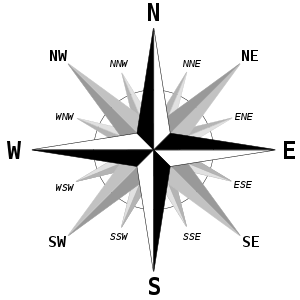Zubin Potok
Zubin Potok (Serbian Cyrillic: Зубин Поток, Albanian: Zubin Potoku) is a town and municipality located in the Mitrovica District in Kosovo.[lower-alpha 1] As of 2015, it has an estimated population of 15,200 inhabitants.[1] It covers an area of 335 km2 (129 sq mi), and consists of the main town and 63 villages.
Zubin Potok | |
|---|---|
Town and municipality | |
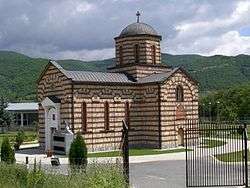 Holy Trinity Church, Zubin Potok | |
 Emblem | |
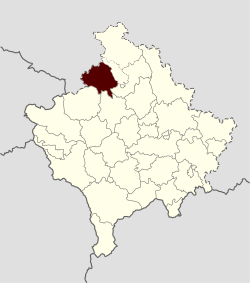 Location of the municipality of Zubin Potok within Kosovo | |
| Coordinates: 42°55′N 20°41′E | |
| Location | |
| District | Mitrovicë |
| Settlements | 64 |
| Government | |
| • Provisional president | Srdjan Vulović (SL) |
| Area | |
| • Total | 335 km2 (129 sq mi) |
| • Land | 333 km2 (129 sq mi) |
| Elevation | 567 m (1,860 ft) |
| Population (2015) | |
| • Total | 15,200 |
| • Density | 45/km2 (120/sq mi) |
| est. | |
| Time zone | UTC+1 (CET) |
| • Summer (DST) | UTC+2 (CEST) |
| Postal code | 40650 |
| Area code(s) | +383(0)28 |
| Car plates | 02 |
| Website | kk |
Zubin Potok is a part of North Kosovo, a region with an ethnic Serb majority that functions largely autonomously from the remainder of ethnic Albanian-majority Kosovo. After the 2013 Brussels Agreement, the municipality became part of the Community of Serb Municipalities.
Settlements
Aside from the town of Zubin Potok, these villages comprise the municipality of Zubin Potok:
|
|
Demographics
| Year | Pop. | ±% p.a. |
|---|---|---|
| 1991 | 8,700 | — |
| 1999 | 12,000 | +4.10% |
| 2015 | 15,200 | +1.49% |
According to the 2011 estimations by the Government of Kosovo, Zubin Potok has 1,698 households and 6,616 inhabitants.[2] In 2015 report by OSCE, the population of Zubin Potok municipality stands at 15,200 inhabitants.[1]
Ethnic groups
The majority of Zubin Potok municipality is composed of Kosovo Serbs with more than 13,900 inhabitants (91.5%), while 1,300 (8.5%) Kosovo Albanians live in the municipality.[1] Most of Zubin Potok's Kosovo Albanians live in the village of Çabër (Čabra).
The ethnic composition of the municipality of Zubin Potok, including IDPs:[3][1]
| Ethnic group | 1991 est. | 1999 est. | 2015 est. |
|---|---|---|---|
| Serbs | 7,750 | 11,000 | 13,900 |
| Albanians | 850 | 850 | 1,300 |
| Others | 100 | - | - |
| Total | 8,700 | 12,000 | 15,200 |
Geography and infrastructure
Economy
Zubin Potok is an agricultural community, yet the level of agricultural production has been in decrease due to the lack of investment. Local factories have been also strongly affected by the lack of consumers in the Albanian parts of Kosovo. Since most factories were established as branches of main Serbian factory chains to serve the Kosovo market, their workers are still employed but work and get paid irregularly. A majority of products sold in the municipality are imported from Serbia.
Gallery
 Holy Trinity Church in Zubin Potok
Holy Trinity Church in Zubin Potok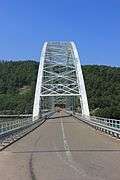 Brnjak Bridge near Gazivoda Lake
Brnjak Bridge near Gazivoda Lake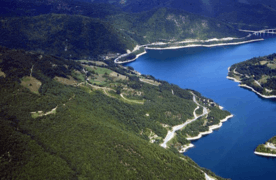 View above Gazivoda Lake
View above Gazivoda Lake- Gazivoda Lake
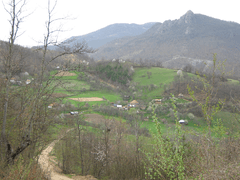 Village in Zubin Potok
Village in Zubin Potok
Notes and references
- Notes
- Kosovo is the subject of a territorial dispute between the Republic of Kosovo and the Republic of Serbia. The Republic of Kosovo unilaterally declared independence on 17 February 2008, but Serbia continues to claim it as part of its own sovereign territory. The two governments began to normalise relations in 2013, as part of the 2013 Brussels Agreement. Kosovo is currently recognized as an independent state by 97 out of the 193 United Nations member states. In total, 112 UN member states recognized Kosovo at some point, of which 15 later withdrew their recognition.
- References
- "Zubin Potok". osce.org. OSCE. Retrieved 19 August 2017.
- "ESTIMATION of Kosovo population 2011" (PDF). ask.rks-gov.net. Government of Kosovo. Retrieved 19 August 2017.
- "OSCEOrganization for Security and Co-operation in Europe". osce.org. Organization for Security and Co-operation in Europe. Archived from the original on 6 June 2011. Retrieved 19 August 2017.
External links
| Wikimedia Commons has media related to Zubin Potok. |
- Official website (in Serbian)
- IOM Kosovo
